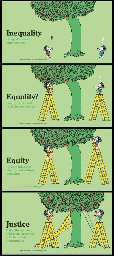YSK The difference between equality, justice and equity.locked



Why YSK: because what seems like equal situation from surface isn't always equal opportunity for all. And even when equal measure of help is provided, it might not be equally useful.
You are viewing a single comment
Its the equity stage. Certain socioeconomic groups have fewer educational opportunities earlier in life. We should really move on to justice and fix that. But first, we need equity to help people now and make up for that.
We have need based programs to address people who need help. Why not bolster to those? Why focus on shifting resources/programs away from the poor to people who objectively don't need it as much? We know how much people need, we can measure income.
How much money/time/reaources are going into programs, grants, scholarships that target single demographics?
That's horseshit. Some poor person living right next door to some other poor person has access to X scholarship but the neighbor doesn't. They went to the same schools growing up. Their parents make comparable money, but magically only one of them could get a free ride scholarship or gets easier access to school.
That's not going to breed resentment. Nooo. Not at all.
Because money doesn't cover the whole issue. Two people starting at the same economic point, one is statistically more likely to have downward economic mobility compared to the other based on race. There are people in our society actively being held back.
What's the differing factor between them?
Obviously if you paint this hypothetical situation as between two identical parties it'll look silly. What do you think would differentiate the two enough to warrant a scholarship difference?
I'm pretty far left, and even I felt resentment as a first-generation college grad from a lower middle class background that had to go into massive debt for law school. A friend of mine had Pilipino and black parents that were college educated and quite well off, but she had a free ride to law school because of her skin color instead of her grades, despite having far less financial need than I did. There's no reason a poor white yokel and a poor black kid, both of whom have substantial structural and cultural barriers keeping them from accessing higher education, should be treated differently. I am not denying history, or saying that systemic racism isn't a thing, but history and systemic racism shouldn't be justifications for furthering inequality.
All things considered, she will be hit with more roadblocks then you over the course of her life only because of the color of her skin, and being mixed. Consider this one of the only times where the shoes on the other foot. Many minorities feel like this constantly about most major elements of society.
You don't solve racism with MORE racism.
And "reverse racism" is no different than any other racism.
Yet that is exactly what is happening. And people see it happening and it turns off some of the same people who would otherwise support your cause. This is a situation that breeds resentment, and stories like the ones posted over the last few days where a LOT of young white males are turning to right-wing groups should not be a surprise to anyone. These terribly thought-out policies are pushing many white (as well as Asian and Indian and Cuban) voters away from left-leaning causes because they feel they are being excluded. The Left is fighting racism in the dumbest way possible... with more racism, and SHOCKINGLY it is blowing up in their faces.
You're missing the larger point. It isn't about individuals.
If your parents and grandparents were from an ethnic/social/other group that did not have access to resources, then there's less chance that you grow up in a household that values education or have resources like food, time with parents and caring adults, emotional support and, financial security and so on. These affect your academic success irrespective of how talented or smart you might be.
Providing better access to higher education for people from such groups is a way to make sure that their children don't grow up in the same environment and the problem is solved over generations.
Such measures of equity are always stop gap measures to address problems until you find grass root level solutions. Right now say protected groups might be first Nations or African Americans. In the future that might change to immigrants from Ukraine or Honduras.
Meanwhile a neighborhood over, the kids don't need scholarships.
Both scenarios breed resentment.
We need better answers, like... free public education, better schools, tutoring supplements for those who ask (including high acheivers), and it needs to go through uni and trades.
We can't keep having people left behind because of structural issues. Poor decisions happen and it's nice to soften blows where we can. But if a person commits no errors and ends up paycheck to paycheck for the rest of their life... that's a failed society.
We need to transcend the "they get x and we don't" part of this and get onto the real thing.